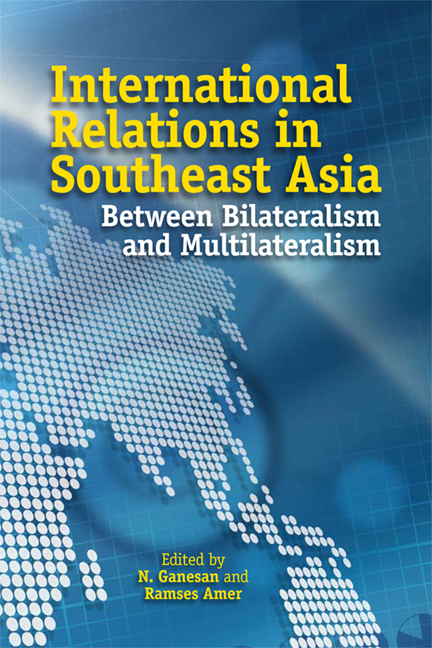Book contents
- Frontmatter
- Contents
- Preface
- List of Abbreviations
- Contributors
- Introduction
- Part I On International Relations
- Part II Case Studies — Mainland Southeast Asia
- 3 Vietnam-Thailand Relations after the Cold War
- 4 Cambodia and Vietnam: A Troubled Relationship
- 5 Thailand-Myanmar Relations: Old Animosity in a New Bilateral Setting
- 6 Thailand-Malaysia Bilateral Relations
- Part III Case Studies — Maritime Southeast Asia
- Conclusion
- Index
4 - Cambodia and Vietnam: A Troubled Relationship
from Part II - Case Studies — Mainland Southeast Asia
Published online by Cambridge University Press: 18 November 2017
- Frontmatter
- Contents
- Preface
- List of Abbreviations
- Contributors
- Introduction
- Part I On International Relations
- Part II Case Studies — Mainland Southeast Asia
- 3 Vietnam-Thailand Relations after the Cold War
- 4 Cambodia and Vietnam: A Troubled Relationship
- 5 Thailand-Myanmar Relations: Old Animosity in a New Bilateral Setting
- 6 Thailand-Malaysia Bilateral Relations
- Part III Case Studies — Maritime Southeast Asia
- Conclusion
- Index
Summary
Purpose and Structure
The purpose of this study is to analyze the relationship between Cambodia and Vietnam through the disputed issues that have, and in some cases still do, affected the bilateral relations. The study deals primarily with the post-1975 period. However, to explain and assess developments and issues of this period, events that took place before 1975 will be referred to. The choice of 1975 is based on the key developments then taking place in the two countries, with communist forces emerging victorious in both Cambodia with the capture of Phnom Penh on 15 April and in the then Republic of Vietnam (South) with the capture of Saigon on 30 April. In order to avoid highlighting some factors, to the detriment of other factors, the empirical developments will be outlined and based on the pattern of interaction. Factors influencing developments will be identified and analyzed. This approach has been tested in earlier research on relations between China and Vietnam and it has contributed to making studies of the relationship more analytical and problem oriented rather than merely descriptive.
The structure of the study is its division into two main parts. First, the empirical part, in which the development of bilateral relations between Cambodia and Vietnam since 1975 is outlined. The second part encompasses two sections, the first is devoted to identifying key factors and issues affecting bilateral relations and discussing their relative importance, while the second a more general concluding analysis.
Cambodia-Vietnam Relations since 1975
Descent into Deep Conflict 1975–78
Following the end of the wars in Vietnam and in Cambodia, border clashes occurred between the two countries during May and June 1975 but were settled in conjunction with a high level meeting in Hanoi in June. A fairly stable situation continued to prevail on the common border throughout 1975 and 1976. In 1976, an attempt was made to settle the dispute over the delimitation of the common land and sea borders by negotiations, but the discussions broke down at a preparatory meeting held in Phnom Penh in May 1976.
- Type
- Chapter
- Information
- International Relations in Southeast AsiaBetween Bilateralism and Multilateralism, pp. 92 - 116Publisher: ISEAS–Yusof Ishak InstitutePrint publication year: 2010

